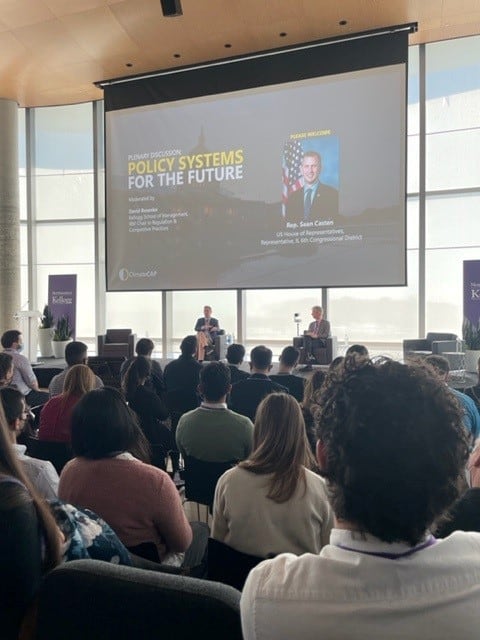Climate, Business, and Policy

My favorite event at ClimateCAP 2022 centered around policy systems for the future. Chicago House of Representatives (Rep.) Sean Casten was an unforgettable presenter who spent an hour speaking about the importance of disruption within climate policy. If someone asked me to pick one thing that made ClimateCAP 2022 so special, it would be extremely challenging. However, I would say that the passion the speakers brought to their presentations is what made the event so special. It is no secret that climate change is one of the biggest crises humanity faces in the foreseeable future.
As research and science advance, we have begun to realize the severe impact of our previous decisions on the world around us and the swift actions we must take to mitigate the years of neglect.

Sean Casten
Recently, Congressman Casten played a key role in advocating for a major climate change breakthrough within our United States government. The Build Back Better Act (H.R.5376), a $2.2 trillion dollar bill focused on climate change and social policy, passed in November 2021 by the House of Representatives. Within the bill, $555 billion dollars was earmarked for clean energy and climate change provisions. Congressmen Casten took us behind the scenes on how the bill passed, and how there is plenty of work still to do. According to the Congressmen, to effectively spend this money (e.g., building out charging stations across the country), both the federal government and states will need to undertake policy changes like revising state zoning requirements. This is just one example that shows why policy disruption is important and how passionate policymakers and students need to continue to stay focused to lead and implement these changes.
To solve climate change, we need to utilize our most valuable resource: human capital. This was one of the key takeaways from Congressman Casten’s presentation. However, it is important that the United States also take steps on the national and international stages to make a lasting impact. Below are some of the highlights from the engagement between Congressman Casten and Kellogg School of Management’s own David Besanko, as they discussed the country’s role in promoting positive climate change policy.
- The U.S. government is incentivizing good and bad actors. If the U.S. government’s goal is to combat climate change, the government needs to punish bad behavior and encourage good behavior. Policies today encourage both good and bad climate-related behaviors via tax credits. For example, the system currently rewards green efficient homes and coal mining. If the government wants to make a positive impact on climate change, our policies need to reflect the correct messaging. According to Congressman Casten, simple changes like these could create the positive behavioral shifts that the United States government needs to implement this change.
- The U.S.’s role on the international stage. In 2019, at the United Nations Climate Change Conference in Madrid (“COP25”), the United States government sent Congressman Casten and House Speaker Nancy Pelosi to partake in a discussion centered around the global impact of climate change. While at the conference, Congressman Casten mentioned a conversation he had with an EU parliamentarian which really stuck with him. His colleague said the following, “We need the United States to take a leadership role against climate change for two major reasons.” First, the United States has the economic means to make climate change policies a reality. This speaks to the strength of the United States economy. Second, the United States is often viewed as a “moral compass” on the international stage. The international community expects the United States to make the right decision when it comes to important policies, which speaks to our perception within the international community.
If there is one thing I took away from the conference, it is that we are in the early stages of climate change disruption. As established companies dedicate more and more resources to the cause and startups pop up across various industries tasked with the specific purpose of solving this important issue, there is little doubt that humanity will begin to make great strides towards fighting climate change. However, it is vitally important that we ensure the right people end up in these roles. Many MBA candidates, like so many I met at the conference, were willing to forgo lucrative MBA salaries at reputable firms in exchange for roles that satisfy their passion for sustainability. I cannot help but feel humbled for both the opportunity to attend ClimateCAP 2022 and to meet the future leaders in the space.
A delegation of 18 MBA students from Emory University’s Goizueta Business School recently attended the ClimateCAP Global Summit to discuss the enormous influence and responsibility business leaders hold in driving toward a climate-smart world. Along with hundreds of leading students and professionals from across the nation, they explored the financial risks and opportunities of climate change along with important stakeholder responsibilities that define how a climate-smart business operates. Through the Business & Society Institute, students, faculty, staff, and partners focus on addressing complex challenges confronting people, the planet, and the business community through academic discovery and purposeful action. To learn more about Goizueta Business School and how principled leaders are driving positive change, visit goizueta.emory.edu.
